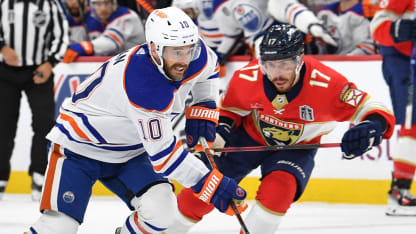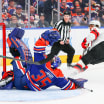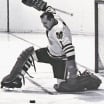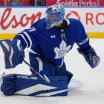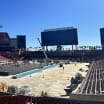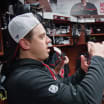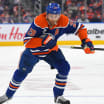When the Florida Panthers and Edmonton Oilers met in Game 7 of the Stanley Cup Final in 2024, it was the 18th time the championship was decided in a winner-take-all game since the NHL went to a best-of-7 format in 1939.
Prior to 2024, the most recent was in 2019, when the St. Louis Blues defeated the Boston Bruins 4-1 at TD Garden to win their first championship.
Home teams are 13-5 in Game 7 of the Cup Final.
Here's a look at each of the 17 Game 7s:
2024: Florida Panthers 2, Edmonton Oilers 1
After blowing a 3-0 series lead, the Panthers were one loss from being on the wrong side of history. Carter Verhaeghe got Florida on the board at 4:27 of the first, but Mattias Janmark tied it 1:17 later. Sam Reinhart's goal at 15:11 of the second turned out to be the winner to give the Panthers their first Stanley Cup championship. Oilers forward Connor McDavid, who led the playoffs with 42 points (eight goals, 34 assists) won the Conn Smythe Trophy as playoffs MVP, just the sixth player from a losing team to do so.
2019: St. Louis Blues 4, Boston Bruins 1
The Blues stunned the packed house at TD Garden by winning the Cup for the first time since entering the NHL in 1967, as well as capping their rise from last place in the NHL standings on the morning of Jan. 3. Conn Smythe Trophy winner Ryan O'Reilly opened the scoring at 16:47 of the first period, and Alex Pietrangelo made it 2-0 at 19:52. Third-period goals by Brayden Schenn and Zach Sanford put the Blues ahead 4-0, and a goal by Boston's Matt Grzelcyk with 2:10 remaining served only to cost rookie goalie Jordan Binnington a shutout.
Binnington, whose arrival in early January keyed the Blues' climb, finished with 32 saves and became the first rookie in NHL history to win 16 games in one playoff year. The Blues became the first team to win the Cup after being last in the League standings at least 30 games into a season.
2011: Boston Bruins 4, Vancouver Canucks 0
The Bruins won the Stanley Cup for the first time in 39 years by becoming the first visiting team to have a shutout in Game 7 of the Final. Brad Marchand and Patrice Bergeron each scored twice for Boston, which had lost Games 1, 2 and 5 in Vancouver and was playing in Game 7 of the Cup Final for the first time since entering the NHL in 1924.
Boston goalie Tim Thomas made 37 saves for his second shutout of the series. He won the Conn Smythe Trophy after allowing eight goals in seven games.
2009: Pittsburgh Penguins 2, Detroit Red Wings 1
Forward Max Talbot and goalie Marc-Andre Fleury helped the Penguins spoil Detroit's bid for back-to-back Stanley Cup championships and become the third team to win Game 7 of the Cup Final on the road.
Talbot scored twice in the second period to put the Penguins ahead 2-0. Jonathan Ericsson's goal with 6:07 left in the third period cut Pittsburgh's lead to 2-1, but Fleury made the best of his 23 saves when he robbed Detroit's Nicklas Lidstrom with one second remaining.
2006: Carolina Hurricanes 3, Edmonton Oilers 1
Cam Ward, a rookie goalie and Edmonton-area native whose parents had season tickets at Rexall Place, completed a Conn Smythe Trophy-winning spring with a 22-save performance that gave the Hurricanes their first NHL championship since entering the NHL as the Hartford Whalers in 1979.
Aaron Ward gave Carolina a 1-0 lead at 1:26 of the first period. Frantisek Kaberle made it 2-0 at 4:18 of the second and Justin Williams scored into an empty net for the clincher after Fernando Pisani's goal 1:03 into the third period cut the lead to 2-1.
2004: Tampa Bay Lightning 2, Calgary Flames 1
The 2004 Lightning had to win Game 6 on the road to get back home for a Game 7. When they did, Ruslan Fedotenko stepped up with two goals to help Tampa Bay win its first championship since entering the NHL in 1992.
Fedotenko made it 1-0 with a power-play goal 13:31 into the first period, then gave Tampa Bay a 2-0 lead when he scored at 14:38 of the second. Craig Conroy's goal at 9:21 of the third was the only shot to beat goalie Nikolai Khabibulin. Lightning captain Dave Andreychuk won the Cup for the first time after playing 1,597 regular-season games without a championship.
2003: New Jersey Devils 3, Mighty Ducks of Anaheim 0
Martin Brodeur made 24 saves for his third shutout of the Cup Final, ending a series that saw the home team win all seven games. Fourth-line forward Mike Rupp was the offensive hero, scoring the first goal early in the second period and assisting on two goals by Jeff Friesen.
Despite the loss, Anaheim goalie Jean-Sebastien Giguere was awarded the Conn Smythe Trophy.
2001: Colorado Avalanche 3, New Jersey Devils 1
The Avalanche also won Game 6 on the road to force a deciding game in their own building, then won the Cup behind the goaltending of Patrick Roy, who made 25 saves. Roy won the Conn Smythe Trophy for the third time in his NHL career. The victory gave defenseman Ray Bourque his first Stanley Cup championship after 22 NHL seasons.
Alex Tanguay put Colorado ahead 1-0 at 7:58 of the first period, then gave the Avalanche a 2-0 lead at 4:57 of the second and set up Joe Sakic's power-play goal at 6:16 for a 3-0 lead. Petr Sykora made it 3-1 at 9:33, but the Devils didn't score again.
1994: New York Rangers 3, Vancouver Canucks 2
Winning the Presidents' Trophy was key to helping the Rangers end a championship drought that dated to 1940. With Game 7 of the Cup Final in front of their own fans at Madison Square Garden, the Rangers took a 2-0 lead after one period on goals by Brian Leetch and Adam Graves.
Mark Messier's second-period power-play goal gave New York a 3-1 lead and proved to be the game-winner after Trevor Linden scored his second of the game early in the third. Mike Richter finished with 28 saves and Craig MacTavish won the final face-off to spark the biggest celebration in New York hockey history.
1987: Edmonton Oilers 3, Philadelphia Flyers 1
The Flyers won Games 5 and 6 to push the series to the limit, then made the packed house at Northlands Coliseum nervous when Murray Craven scored 1:41 into Game 7 to give Philadelphia a 1-0 lead.
But Mark Messier tied the game 1-1 at 7:45, Jari Kurri beat Ron Hextall 14:59 into the second period to put Edmonton ahead 2-1 and Glenn Anderson scored an insurance goal with 2:24 remaining in the third period to seal the Oilers' third championship in four years. Hextall had to settle for the Conn Smythe Trophy after making 40 saves, the most in Game 7 of the Cup Final.
1971: Montreal Canadiens 3, Chicago Blackhawks 2
The home team won the first six games of the series and it looked like the Blackhawks would continue that trend in Game 7. They led 2-0 in the second period on goals by Dennis Hull and Kevin O'Shea before an 80-foot slap shot by Montreal's Jacques Lemaire eluded Chicago goalie Tony Esposito, giving the Canadiens life.
Henri Richard tied the game 2-2 at 18:20 of the second period and put Montreal ahead 2:34 into the third. Rookie goalie Ken Dryden did the rest, preserving the victory that sent future Hockey Hall of Famer Jean Beliveau into retirement with 10 Stanley Cup championships as a player. The Canadiens became the second team to win Game 7 of the Cup Final on the road.
1965: Montreal Canadiens 4, Chicago Blackhawks 0
Montreal and Chicago split the first six games, each winning three times at home, but the Canadiens wasted no time getting the jump in Game 7 at the Forum. Jean Beliveau scored 14 seconds after the opening face-off, the fastest goal in Game 7 of the Cup Final, and Montreal scored three more goals before the first period ended.
That was more than enough support for goalie Gump Worsley, who made 20 saves. It was the first of four championships in a span of five seasons for the Canadiens. Beliveau, who had 10 points (five goals, five assists) in the seven-game series, was the first winner of the new Conn Smythe Trophy.
1964: Toronto Maple Leafs 4, Detroit Red Wings 0
The 1964 Cup Final was the first in nine years to go the distance and the Maple Leafs had to win Game 6 on the road to get there. Bob Baun's overtime goal sent the series back to Maple Leaf Gardens for the deciding game.
The euphoria of that victory helped to carry the two-time defending champion Maple Leafs to victory in Game 7. Andy Bathgate gave Toronto a 1-0 lead 3:04 into the first period. Dave Keon, Red Kelly and George Armstrong broke the game open with third-period goals, and Johnny Bower made 33 saves to become the first goalie with a Game 7 shutout The Maple Leafs won their third consecutive championship.
1955: Detroit Red Wings 3, Montreal Canadiens 1
The defending champion Red Wings completed the first Cup Final to see the home team win all seven games by defeating the Canadiens at Olympia Stadium.
The Red Wings hadn't lost at home in nearly four months and kept that record intact. Alex Delvecchio scored twice and Gordie Howe's goal with 11 seconds left in the second period proved to be the game-winner, ending a stretch of four championships in six seasons. Detroit didn't win the Cup again until 1997.
1954: Detroit Red Wings 2, Montreal Canadiens 1, OT
Tony Leswick's fluke goal gave the Red Wings their second overtime win in Game 7 of the Cup Final in five seasons.
The Canadiens took a 1-0 lead on a first-period goal by Floyd Curry, but Red Kelly scored 1:17 into the second period to make it 1-1 and neither team scored again in regulation. Leswick's game-winner at 4:29 of overtime came when he picked up the puck at the right point and flipped it toward the net. Montreal defenseman Doug Harvey tried to knock the puck out of the air with his glove; instead, he tipped it over goalie Gerry McNeil's shoulder.
1950: Detroit Red Wings 4, New York Rangers 3, 2OT
The Red Wings were heavily favored against the fourth-place Rangers but had to rally to win Game 6 and spent much of Game 7 playing from behind. New York led 2-0 and 3-2 before Jimmy McFadden tied the game 3-3 at 15:57 of the second period.
Neither team scored again until George Gee won a face-off in the second overtime and Pete Babando beat goalie Chuck Rayner at 8:31 for the win. It's still the longest Game 7 in Cup Final history.
1945: Toronto Maple Leafs 2, Detroit Red Wings 1
The Red Wings had the home-ice edge in Game 7, but that wasn't enough to complete a comeback against the Maple Leafs. Toronto won Games 1, 2 and 3, only to see Detroit win the next three.
Mel Hill gave Toronto a 1-0 lead 5:38 into the first period. Detroit's Murray Armstrong tied the game 1-1 when he scored at 8:16 of the third, but a penalty by Detroit's Syd Howe led to Babe Pratt's power-play goal at 12:14, beginning a run of four championships in five years for the Maple Leafs.
1942: Toronto Maple Leafs 3, Detroit Red Wings 1
The first Game 7 in Cup Final history (the best-of-7 format had been adopted in 1939) concluded the greatest comeback in NHL history, with Toronto winning four straight games after losing the first three. No other team has won the Cup after losing the first three games in the Final.
Detroit led 1-0 after the second period, but Sweeney Schriner tied the game 1-1 at 7:47 with a power-play goal. Pete Langelle put Toronto ahead 2-1 at 9:48, and Schriner scored again at 16:17 to complete the comeback.
